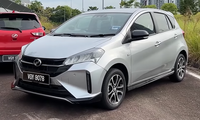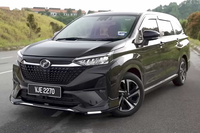Perodua
This article needs additional citations for verification. (May 2009) |
 | |
 Perodua corporate office in Rawang, Selangor | |
| Company type | Public |
|---|---|
| Industry | Automotive |
| Founded | 1993[1] |
| Headquarters | Sungai Choh, Rawang, Malaysia |
Area served | Malaysia, Brunei Darussalam, Mauritius, Seychelles, Singapore, Sri Lanka |
Key people | Tan Sri Asmat Kamaludin (Chairman) Dato Zainal Abidin Ahmad (President & CEO) |
| Products | Automobiles |
| Owners |
|
Number of employees | 11,500 (2023) |
| Website | www |
Perusahaan Otomobil Kedua Sendirian Berhad[2] (Second Automobile Enterprise Private Limited), usually abbreviated to Perodua (Malay: [pəroˈdua]), is Malaysia's largest car manufacturer, followed by Proton Holdings.
History
[edit]It was established in 1993 and launched its first 5-door hatchback, the Perodua Kancil, in August 1994.[3] 'M2' refers to the codename which was used when the project to establish Perodua was still top secret. Initially Perodua mainly produced minicars and superminis, and did not have models in the same market segments as Proton. In recent years, however, its targeted market segments have started to overlap with Proton's – especially in the super-compact segment, where the Perodua Myvi has fought off the Proton Savvy and is now competing with the Proton Iriz.

Perodua does not design or engineer its main components, such as engines and transmissions, in house. The cars have historically used Daihatsu component designs. Daihatsu held a 20% stake in Perodua at the company's launch, increasing this to 25% in 2001 and then to 35%.[3] In 2004 Perodua started assembling the Toyota Avanza at its plant in Rawang, for sale in Malaysia.
Perodua sold more than 207,100 vehicles in 2016, which was its highest-ever yearly sales record, and achieved a highest-ever market share of 35.7%.[4] The company is planning to set up a second car manufacturing plant with a planned $770 million investment in the coming years.
Perodua's shareholders currently include the UMW Corporation (38%), Daihatsu Motor Co. (20%), Daihatsu (Malaysia) (5%), MBM Resources (20%), PNB Equity Resource Corporation (10%), Mitsui & Co. (4.2%) and Mitsui & Co. (Asia Pacific) (2.8%).[5][6]
Sales
[edit]
Domestic
[edit]Perodua is expected to become the largest manufacturer of subcompact cars in Southeast Asia. By October 2005, it had produced a cumulative total of 1 million cars. By July 2008, it increased its manufacturing output to 240,000 per year.[8]
Compared to Proton, Perodua has been quite successful in its business ventures. The automobile manufacturer is popular in Malaysia, with the Perodua Myvi having sold 80,327 units in 2006, outselling its rival's best-selling car, then the Proton Wira, which sold only 28,886 units in Malaysia. In the period 2006–2010 Perodua was the best-selling car company in Malaysia. In the first half of 2011, however, Proton overtook Perodua to become the best-selling brand. It was many years since the first national carmaker had been the best-seller, and though part of the reason was that Perodua's supply in the second quarter was limited (due to phasing-out of the old Myvi) and also the problems caused by the amendments to the H-P Act, it has to be said that Proton's current line-up has drawn many customers, notably the core models Proton Saga and Proton Persona. Proton delivered 85,223 units to take a 28.7% share of the TIV while Perodua delivered 79,467 units, a difference of 5,756 units.[9]
International
[edit]In the United Kingdom, Perodua's cars were sold by some Proton dealers, who wished to attract customers seeking a smaller and cheaper alternative to the Proton range. Sales numbers in the UK were small, however, and in 2008 Perodua sold only 624 cars (down from 914 in 2002) – insignificant compared to other brands. Sales were up slightly in 2009 (to 650) and then to 761 in 2010,[10] mainly due to the new Perodua Myvi selling comparatively well.[11]
Currently, Perodua cars are exported to Singapore, Brunei, Mauritius, Fiji, Sri Lanka, and Seychelles.[12] The company also exported the Myvi as the Daihatsu Sirion to Indonesia, which makes up for 55 percent of their exports in 2020.[13]
In 2021, the company started studying whether exporting used Perodua cars overseas from Malaysia would be feasible.[14] As of 2024, Perodua is exporting used cars to some countries like Fiji.[15] At the same time, exports of used cars were halted in Sri Lanka.[15]
Models
[edit]Current models
[edit]| Model | Introduction | Current model | Vehicle description | ||
|---|---|---|---|---|---|
| Introduction (model code) | Update/facelift | ||||

|
Myvi | 2005 | 2017 (M800) | 2021 | B-segment hatchback. Exported to Indonesia as the Daihatsu Sirion. |

|
Alza | 2009 | 2022 (W150) | – | Three-row B-segment MPV based on the Daihatsu Xenia. |

|
Axia | 2014 | 2023 (A300) | – | A-segment hatchback based on the Daihatsu Ayla and the successor to the Perodua Viva. |

|
Bezza | 2016 | 2016 (B300) | 2020 | B-segment sedan, not shared with other overseas models. |

|
Aruz | 2019 | 2019 (F850) | – | Three-row, rear-wheel-drive B-segment SUV based on the Daihatsu Terios. |

|
Ativa | 2021 | 2021 (A270) | – | A-segment SUV based on the Daihatsu Rocky. |
Former models
[edit]- Perodua Kancil (1994–2009; A-segment hatchback, based on the Daihatsu Mira L200)
- Perodua Rusa (1996–2007; microvan, based on the Daihatsu Zebra)
- Perodua Kembara (1998–2007; A-segment SUV, based on the Daihatsu Terios J100)
- Perodua Kenari (2000–2009; A-segment hatchback, based on the Daihatsu Move L900)
- Perodua Kelisa (2001–2007; A-segment hatchback, based on the Daihatsu Mira L700)
- Perodua Viva (2007–2014; A-segment hatchback, based on the Daihatsu Mira L250)
- Perodua Nautica (2008–2009; A-segment SUV, based on the Toyota Rush)
Slogans
[edit]Corporate slogan
[edit]- "Kehebatan Yang Pasti" (Excellence That Assured) (1997–2008)
- "Happy Motoring" (2000–2008)
- "Building Cars, People First" (2008–present)
- "Kepuasan Pelanggan Sepenuhnya" (Complete Customer Satisfaction) (2021–present)
Anniversary slogan
[edit]- 10 Years of Excellence (Perodua's 10th anniversary slogan in 2003)
- 20 Years of Driving Value and Beyond (Perodua's 20th anniversary slogan in 2013)
Brand Identity
[edit]-
First logo since 1993. (1993-1998)
-
Secondary logo. (1998-2008)
-
Current logo since 2008. (2008-Now)
Logo history
[edit]Perodua organised a competition in 1997 to find a new corporate logo, to be launched together with their upcoming model, tentatively known as the X555. The competition was won by Johnson Ng Weng Kuan, an architecture student from Universiti Teknologi Malaysia. Perodua officially launched the new corporate logo on 24 August 1998 when they launched Malaysia's first sport utility vehicle, the Perodua Kembara.
The new logo maintains the 'P' and '2' and the colours of the old, squarish logo, but has been stylised further to become elliptical, which is more fluid and dynamic. The green colour represents social responsibility to the environment and the community, while the red colour symbolises the development of a competent workforce and resilience in meeting challenges in the globalised world. However, the emblems mounted on the company's latest cars have black in place of the green and red areas, with the chrome relief maintained as it was.
Awards and accolades
[edit]- People's Choice, Automotive Category (Bronze) - Putra Brands Awards 2010[16]
- People's Choice, Automotive Category (Silver) - Putra Brands Awards 2012, 2015 & 2016[16]
- Most Favorite Brand Automotive Sedan/Compact Cars - The BrandLaureate Bestbrands Award 2016—2017[17]
- People's Choice, Automotive Category (Gold) - Putra Brands Awards 2017 & 2018[16]
References
[edit]- ^ "Welcome to the Official Perodua Website".
- ^ "Welcome to the Official Perodua Website".
- ^ a b World of Cars 2006·2007. Warsaw, Poland: Media Connection Sp. z o.o. 2006. p. 203.
- ^ "Perodua in 2016 - 207,100 vehicles sold; highest ever market share with 35.7% of TIV; 6% growth in exports - paultan.org". 17 January 2017.
- ^ "Perusahaan Otomobil Kedua - Corporate". www.perodua.com.my. 2017. Archived from the original on 8 October 2017. Retrieved 8 October 2017.
- ^ "UMW Holdings Berhad - Corporate presentation - March 2017" (PDF). ir.chartnexus.com. March 2017. Archived (PDF) from the original on 8 October 2017. Retrieved 8 October 2017.
- ^ "Sales of Perodua passenger vehicles in Malaysia, 1994 – 2013". 29 January 2014. Retrieved 1 February 2014.
- ^ "Perodua set to be largest compact car maker in region". Daily Express. Archived from the original on 12 January 2009. Retrieved 10 May 2009.
- ^ "The car market after 6 months". motortrader.com.my.
- ^ "UK Auto Sales By Brand – 2010 Year End". Good Car Bad Car. 10 January 2011.
- ^ "Perodua Maintains Growth as Market Slows (press release)". Perodua UK. 18 August 2010.
- ^ "Welcome to the Official Perodua Website".
- ^ "Perodua exports hit 2,825 units in 2019, up from 2,184 - paultan.org". Paul Tan's Automotive News. 21 January 2020. Retrieved 27 January 2022.
- ^ Tan, Danny. "Perodua studying export of traded-in used cars – CEO". paultan.org.
- ^ a b Poon, Elim (14 June 2024). "Perodua plans East Coast spare parts hub". The Star. Retrieved 12 July 2024.
- ^ a b c "WINNERS". PUTRA BRAND AWARDS. Archived from the original on 30 November 2018. Retrieved 30 November 2018.
- ^ "Most Favourite Brand Awards - The BrandLaureate". THEBRANDLAUREATE. Archived from the original on 30 November 2018. Retrieved 30 November 2018.




